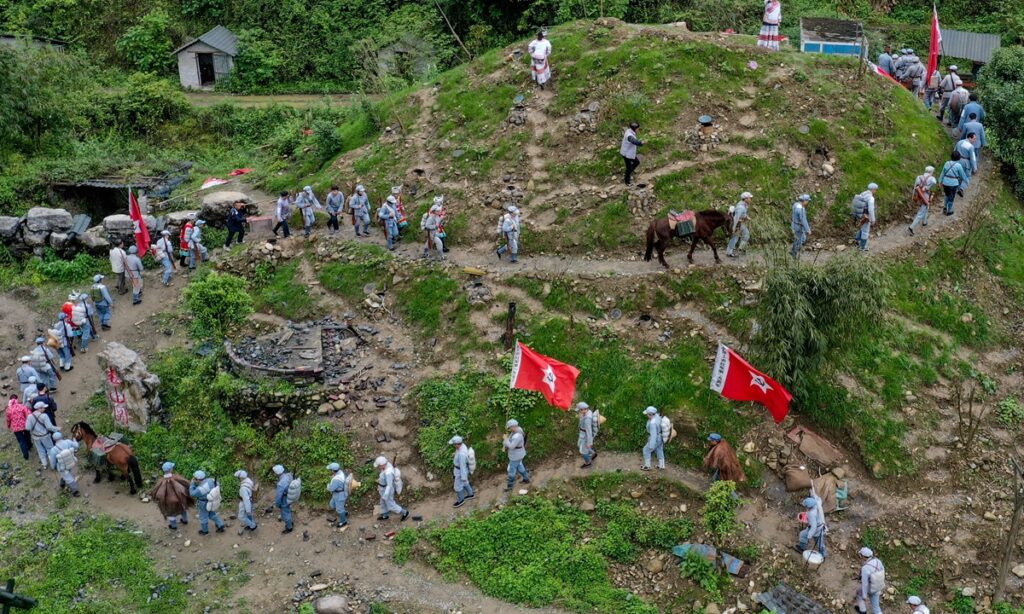Travel to historical sites with a revolutionary legacy in China, or “red tourism,” continued to gain popularity during the three-day Dragon Boat Festival which ended on Monday, with bookings for red tourism products surging 60 percent year-on-year, platform data showed.
According to a report that online travel booking platform Trip.com sent to the Global Times, Beijing, Nanjing, East China’s Jiangsu Province and Yan’an, Northwest China’s Shaanxi Province were among the most popular red tourism destinations during the holiday.
The Military Museum of the Chinese People’s Revolution and the Zaoyuan revolutionary site in Yan’an city were among top 10 red tourism sites.
A 38-year-old Beijing resident named Liu Jie traveled with his family to Xibaipo Village, a revolutionary base of the Communist Party of China (CPC), in North China’s Hebei Province. “We want our kid to receive patriotic education from visiting the red tourism site and understand that happiness is achieved through hard work,” he told the Global Times, noting that he plans to take his child to one red tourism attraction every year to learn from the CPC’s revolutionary spirit.
According the culture and tourism department of Central China’s Hubei Province, visiting historical sites and receiving revolutionary education has now become a new choice for Chinese sight-seers. Short videos promoting Wuhan’s red tourism gained 18 million views on short-video platform Douyin, while red tourism accounted for more than 25 percent of the total travel revenue in Daye city, read an article on the government agency’s website on Saturday.
Xu Xiaolei, marketing manager at China’s CYTS Tours Holding Co, told the Global Times on Monday that red tourism in China has gained popularity over the past several years, especially in 2021, which marks the 100th anniversary of the founding of the CPC.
“This reflects a more profound understanding the Chinese people have of the CPC, while their sense of fulfillment and satisfaction has grown stronger,” Xu said.
According to the Ministry of Culture and Tourism, the number of trips to red tourism sites across the country increased to 1.41 billion in 2019 from 140 million in 2004.
On May 31, the Chinese authorities rolled out 100 renowned travel routes to celebrate the 100th anniversary of the founding of the CPC, giving a further boost to the booming red tourism.
The Civil Aviation Administration and the Ministry of Culture and Tourism said in recently published guidelines that they will propose to accelerate the construction of airports in old revolutionary base areas, and support airlines to increase capacity, open more routes, and increase flights at airports in red tourism regions.
Chinese airlines are rushing to launch more services to cater to the new market opportunity. Hainan Airlines said that company will fly about 190 red tourism routes during the summer air travel season, covering main old revolutionary base areas across the country, with an average daily volume of about 300 flights and an average of nearly 30,000 passengers per day.
However, Xu said that in order to promote the long-term sustainable development of red tourism, travel agencies should creatively increase interactions in their products to increase fun by allowing visitors to immerse themselves in experiencing red culture — for example, arranging a wide variety of cultural shows.
“The internet and technologies have a greater role to play in boosting red tourism,” he said.
The Ministry of Culture and Tourism has released a plan for the development of the tourism sector during the 14th Five-Year Plan period (2021-25), to promote patriotism and revolutionary tradition education and boost the development of red tourism.
The ministry aims to improve the development quality of 300 red tourism attractions, while offering support for the fast development of old revolutionary base sites.
Actors recreate the scenes of the Red Army’s Long March in Loushanguan in Zunyi, Southwest China’s Guizhou Province on April 20. Loushanguan is actively promoting its red tourism for tourists to trace revolutionary relics and better experience the red culture. Photo: Xinhua



